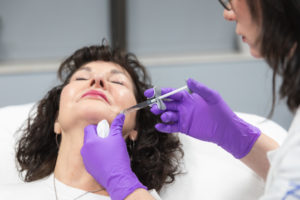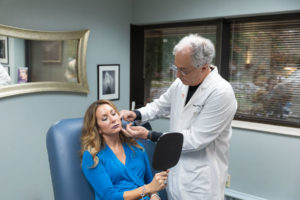
Recent reports about the occurrence of facial swelling in people who had been previously treated with cosmetic fillers and then received the COVID-19 vaccine have generated a great deal of interest and concern. Because nearly 3 million people in the U.S. currently have had injectable cosmetic facial fillers and their growing popularity, this is understandable. But what are the facts and what does the science tell us?
One of the most reliable sources for information is the data from the FDA (Food and Drug Administration) report directly from the actual clinical trials. Three of the 30,000 patients in the Moderna vaccine trial exhibited facial swelling shortly after receiving the vaccine and had a history of receiving facial cosmetic fillers several weeks earlier. The swelling was limited and temporary and quickly resolved with medical treatment utilizing steroids and antihistamine medication.
Currently, in the U.S., the COVID-19 vaccine is available from 2 companies, Moderna and Pfizer/BioNTech but so far, the swelling was only associated with the 3 patients in the Moderna trial. Both approved COVID-19 vaccines are very similar in that they specifically stimulate our immune system to produce antibodies and protection from the Coronavirus. They do this by utilizing a replica portion of the specific messenger RNA (mRNA) sequence to stimulate our body’s immune system to produce a version of the virus spike protein which then generates the increased immune response in our system for protection. There is no live or attenuated virus in these vaccines, only a sequence of the mRNA with a lipid carrier, and the safety profile in the studies with tens of thousands of participants have been exceptional and consistent.
Due to the popularity and high interest in aesthetics and injectable facial fillers, and the importance of the COVID vaccine, understandably several questions have been generated. Here are some of the most frequent and here are the facts:
If I have had previous injectable cosmetic fillers, is it safe for me to receive the COVID vaccine?

Most definitely yes. According to the FDA review, the limited and temporary facial swelling in only 3 of 30,000 trial participants indicates that the association is extremely rare and easily treatable when it occurs. Considering the growing prevalence of the Coronavirus infection and the potential and unpredictable health implications, the CORONA vaccine is currently our best opportunity to achieve meaningful protection. Even with the fast-track vaccine trial studies, the protection profile of both the Pfizer and Moderna vaccines was remarkable (nearly 95%) and the safety profile excellent. It also should be emphasized that current FDA-approved hyaluronic (HA) fillers dissolve over time after injection although their stimulatory beneficial effect may persist.
What is the likely cause of the facial swelling in the 3 people who had previous cosmetic fillers and received the COVID vaccine?
Vaccines work by stimulating our immune systems against a specific pathogen so essentially after vaccination our immune systems are stimulated and on ‘high alert’ for any substance that might be considered ‘foreign’ or unrecognized. The current hyaluronic (HA) fillers that are FDA approved and very popular, are nearly identical to the natural HA that is produced in our bodies. Numerous research and clinical studies confirm that these fillers are safe and so ‘natural’ that they typically do not elicit any significant immune reaction in most individuals. Rarely however some reactivity in people who may have increased sensitivity or autoimmune issues may be experienced. The most supportable theory is that the stimulated immune reaction created by any vaccine, including COVID, may create some reaction in rare individuals due to their genetics or a preexisting condition involving an over-stimulated immune system as is experienced in certain autoimmune conditions.
What should I do if I am considering the COVID vaccine and interested in cosmetic facial filler aesthetic treatments?
The most important recommendation is to please do not delay or avoid the COVID vaccine if you have had or are planning cosmetic fillers because the benefits of the vaccine are far greater than the very infrequent possibility of an inflammatory or allergic reaction.

Due to the stimulation of the immune system by the COVID or any vaccine, it would be reasonable to delay any filler treatment for several weeks after receiving a vaccine to reduce the chance of any excessive reaction, even though this is a rare occurrence and if it occurs, typically easily treatable. Most of these reactions are due to excess inflammation from a stimulated immune system and not true or severe allergic reactions. If you have a known history of sensitivities and allergies, it is recommended that you inform the health care provider administering the vaccine and plan on being observed for at least 15 minutes after receiving the vaccine in the unlikely event that you may have a reaction.
Conclusion
The take-home message from the FDA reviews and the associated clinical data is that inflammatory reactions in those who have had cosmetic fillers and receive the COVID vaccine are very rare and easily treated with medication. At EVOLV Plastic Surgery and Medical Aesthetics, we typically pre-treat patients planning to receive injectable facial fillers as well as other aesthetic procedures that might result in swelling, with oral steroids and recommend antihistamines and naturopathic supplements to reduce swelling or potential bruising.
If you are one of the nearly 3 million people with previous facial fillers, it is not recommended or necessary to delay or avoid COVID vaccination due to the low probability of a reaction and most importantly, the importance of protection from COVID infection and potentially associated health conditions.
If you have any additional questions regarding cosmetic fillers and the COVID vaccine, please feel free to contact any of our EVOLV professional staff.


